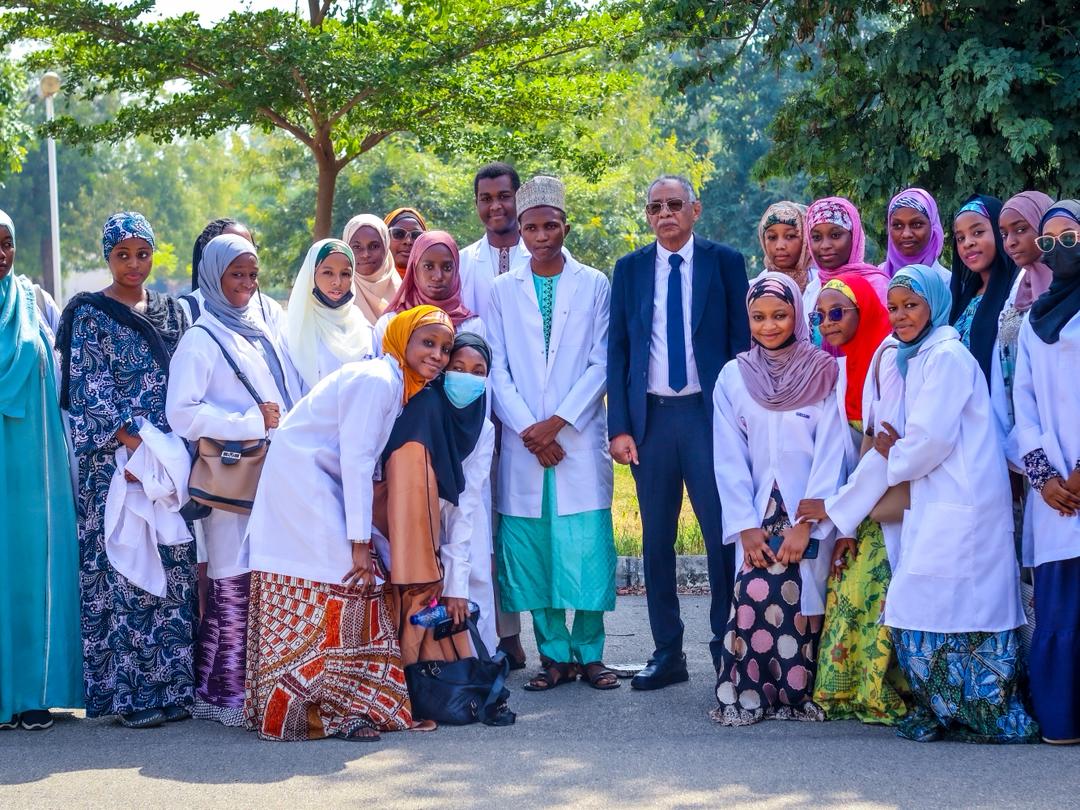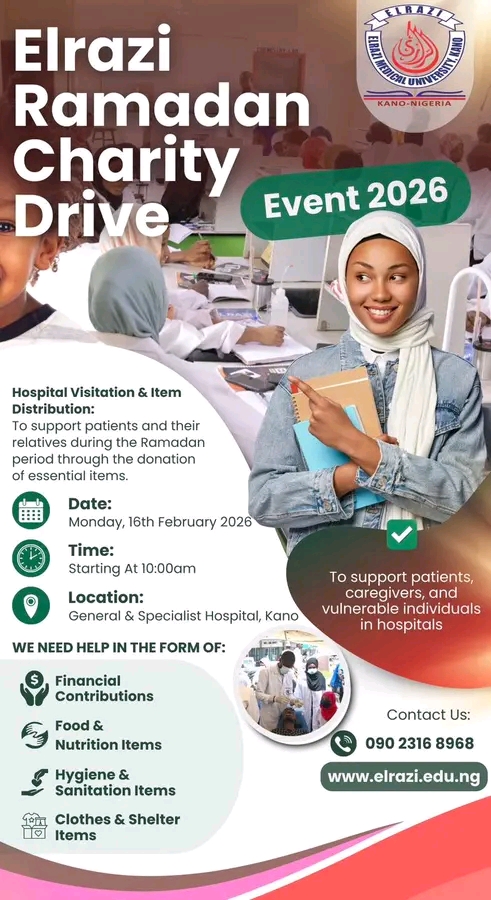 Health
Health
Historical Background & Institutional Identity
Yusuf Maitama Sule Hospital (also referenced at times as Yusuf Maitama Sule Teaching Hospital) is a public health-care facility located in Kano State, Nigeria. It has local significance as part of the region’s tertiary and secondary health-care infrastructure.
The facility appears in multiple sources: one listing has it located at Tamburawa, Dawakin Kudu Local Government Area of Kano State. There is also mention of a significant conversion: the hospital initially known as Muhammad Abdullahi Wase Specialist/General Hospital in the Nasarawa area of Kano was approved for conversion into the “Yusuf Maitama Sule University Teaching Hospital” to serve Yusuf Maitama Sule University, Kano (YUMSUK).
The name “Yusuf Maitama Sule” honours the late Alhaji Yusuf Maitama Sule (1929-2017), a prominent elder statesman from Kano State.
In short: YMSH is part of Kano’s evolving public health network; either as an advanced referral/teaching hospital or a major secondary care provider, depending on which part of the facility is referenced. Its linkage with YUMSUK and its status upgrade suggest that the institution is intended to evolve into a more advanced care and training facility.
---
Mission, Role & Strategic Importance
While I did not locate a formal mission & vision statement specifically for YMSH in accessible public documentation, its strategic role can be deduced from its functions:
Service delivery: YMSH serves as a health-care provider for patients in Kano State and possibly neighbouring areas.
Teaching/training: Through its intended conversion to a teaching-hospital status for YUMSUK, YMSH is poised to become a centre for medical students, resident doctors, allied health training. For example, sources mention postgraduate doctors training at the facility.
Referral & specialist care: Given the transformation from a general hospital towards teaching status, YMSH is meant to carry higher-level care, diagnostics, and treatment services than primary facilities.
Regional health system strengthening: In Kano State, where urban and rural health needs are high, YMSH is strategically placed to support improved access, reduce travel burdens to distant tertiary hospitals, and anchor local health-care capacity.
Given the alignment with a university and the upgrade plans, YMSH is not just a hospital but part of a broader health-education-service ecosystem in Northern Nigeria.
---
Services, Departments & Training
According to one database entry, the “Yusuf Maitama Sule Teaching Hospital” (Tamburawa, Dawakin Kudu) offers a wide range of services:
Medical services including cardiology, dermatology, haematology, infectious diseases
Surgical services: general surgery, anaesthesia, radiology
Paediatrics; Obstetrics & Gynaecology; Antenatal care; Immunization; HIV/AIDS services; Tuberculosis; Non-communicable diseases; Family planning; Child survival; Accidents & emergency; Nutrition; Health education; Community mobilisation.
Operating 24 hours daily, the facility is registered under the Nigerian Ministry of Health (facility code listed).
Other sources note that YMSH is to become the teaching hospital for YUMSUK and was undergoing accreditation for that role.
Training side-note: A key milestone: The university hospital “produced the first batch of senior resident doctors” (postgraduate exam achievers) in 2021 at the facility.
Hence, YMSH provides both clinical services and training opportunities, making it a hybrid institution bridging care and health professional education.
---
Infrastructure, Location & Operational Considerations
Location & size:
At the Tamburawa site (Dawakin Kudu LGA).
There is also mention of the Nasarawa (Kano city) general hospital being converted to YMSU Teaching Hospital status.
Infrastructure & challenges:
The hospital, in its teaching hospital form, is still developing. Accreditation and facility upgrades are ongoing.
One news piece reported that the hospital (or affiliated university teaching hospital) had severe water-shortage issues: reliance on water tanker deliveries, inadequate supply hindering operations.
Accessibility & operation:
The facility operates 24 hours a day. (From the Tamburawa listing)
As a public hospital linked to a university and state government institution, it likely receives referrals and handles complex cases, meaning patient traffic may be high and waiting times significant.
For patients, staff, or students, these features mean that while the hospital is promising in scope and intent, its infrastructures (utilities, training facilities, hospital amenities) may still be in transition.
---
Strengths & Value Proposition
Integration of training and service: As it moves toward teaching hospital status, YMSH offers opportunities for combined clinical experience and medical education—a strength for trainee doctors, nurses, allied health professionals.
Regional relevance: Being located in Kano State and poised to serve a large catchment area positions the hospital as an important regional health asset.
Range of services: From general to specialist care (cardiology, surgery, OBG, paediatrics) making it more than just a local clinic.
Development momentum: The accreditation efforts and production of resident doctors signal ambition and upward trajectory.
---
Challenges & Areas to Watch
Infrastructure & utilities: The water-shortage report signals systemic utilities issues that hamper care delivery.
Resource constraints: Teaching hospitals tend to require higher investments (beds, labs, imaging, specialist staff). If YMSH is still in transition, it may lack full specialist capacity, up-to-date equipment, or sufficient staffing.
Patient load & service quality: With major hospitals in the region often experiencing high demand, there is risk of long waiting times, congestion, fragmented services unless capacity keeps pace.
Accreditation & readiness: While the hospital is designated for upgrade, full teaching-hospital accreditation and all associated facilities may still be under development. This could affect student training quality or specialist services temporarily.
Funding & sustainability: Public hospitals in Nigeria often face funding shortfalls, maintenance backlogs and staffing retention challenges. YMSH will need sustained investment to meet its ambitions.
---
Implications for Stakeholders
For patients: YMSH offers the potential for improved access to specialist care closer to home (Kano region). Patients should, however, check availability of specific services (e.g., advanced imaging, specialist consultations) and be aware of possible limitations due to transition status.
For students/trainees: If you are interested in health sciences training (medicine, nursing, allied health), YMSH provides an opportunity within Kano State to train in a facility undergoing transformation to full teaching hospital status—potentially offering exposure to a wide range of cases and teaching formats. However, one should verify the current status of the department, equipment, tutor availability and accreditation.
For policymakers and community: YMSH is a key part of Kano’s health-service architecture. Its progress, efficiency and resource-use will directly impact regional health outcomes, reduce pressure on other referral hospitals, and build human-resource capacity for health in Northern Nigeria.
---
Future Outlook & Strategic Significance
As YMSH transitions into full teaching-hospital status, its strategic significance is pronounced:
Strengthening medical training: With YUMSUK’s medical programme relying on the hospital for clinical training, YMSH stands to become a nexus for producing medical doctors and specialists in the region.
Reducing patient referral burden: Improved capacity could mean fewer patients travelling outside Kano for specialist care.
Research & innovation potential: As a teaching hospital, YMSH can become a site for clinical research, public-health studies relevant to North-West Nigeria, and innovation in health-delivery.
Community health improvement: With expanded services and outreach, YMSH can contribute to regional maternal and child health, infectious disease control, non-communicable disease management and health‐education.
However, these outcomes depend on: financing, infrastructure upgrade, staff attraction/retention, full accreditation, and integration into the health-and-education ecosystem.
---
Concluding Summary
Yusuf Maitama Sule Hospital in Kano represents a crucial health-care and training institution in Northern Nigeria. With a changing role from general hospital toward teaching hospital (for YUMSUK), broad service offering, and strategic regional location, it holds promise for patients, trainees and the health system at large.
Nevertheless, it faces typical public-health-institution challenges: utilities, infrastructure, resources, service quality and transitional status. For anyone engaging with the hospital—whether as a patient, medical student or health-system partner—it is important to approach with realistic expectations, verify specific service/training availability, and monitor how the institution develops.






